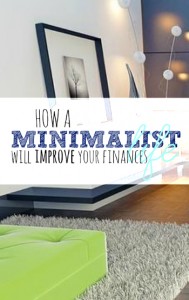
In a gist minimalism is eliminating things from your life that don’t serve a purpose or bring you happiness. These aren’t just material items either. They can be negative people in your life or something such as a soul-sucking job.
Adopting a minimalist attitude can improve your life in many ways. You’ll be dedicated to paying attention to what brings you happiness and matters the most. And since you only have one life to live, focusing on the important things is what you should be doing anyway.
Adopting a minimalist lifestyle can even help you improve your finances. Being more intentional about what you buy will help decrease your spending. You’ll also be able to focus on your financial goals with less physical and mental clutter around to distract you.
Here are the five main ways adopting a minimalist lifestyle can help you improve your personal finances.
#1 You’ll Buy Less Stuff
When you try adopting a minimalist lifestyle one of the first things you’ll do rid is your home of all the unneeded items you’ve purchased over the years. You can throw away the items, donate them, or sell them to add some extra money to your bank account.
After you’ve worked so hard to rid yourself of all the stuff that you don’t love, use, or need you’ll be trying extra hard not to fill your home back up. Since you’re focused on only bringing home items that will bring value to your life you’ll spend a lot less money.
Most minimalists also focus on buying high-quality items instead of inexpensive things that break. You’ll start seeing everything you buy as an investment and purchase the best items you can afford. This will save you money in the long run because you won’t have to replace things as often.
#2 You’ll Be Able to Downsize
Another benefit of adopting a minimalist lifestyle is being able to downsize.
Getting rid of unwanted belongings through things like dumpsters and choosing to sell iPads online, as well as being more intentional about what you buy will enable you to live in a much smaller space. You won’t need a 2,000 square foot house with lots of cabinets and closets anymore. You might be able to live in a one bedroom house or studio apartment, saving you hundreds of dollars in rent every month.
If you’ve been renting a storage unit for more space, you’ll be able to get rid of it and save a couple hundred dollars per year. You might even be able to downsize to a smaller vehicle because you don’t need room for lots of shopping bags.
#3 You’ll Be Able Focus on Your Financial Goals
Minimalism is about centering your life around the things that matter and being more mindful about your choices. As you remove both physical and mental clutter from your life, you’ll have more headspace to clarify what your financial goals are and focus on them with greater intensity.
Spelling out your goals will make it easier to progress instead of falling back into the same behavioral patterns. Your new mindset of getting rid of things that don’t serve you will help you identify and change the habits that are holding you back financially. If ordering things on Amazon is causing you to rack up credit card debt, for example, it will be easier to cancel Prime and block the website from your phone.
Your newfound sense of focus and purpose will also make it easier to achieve your career goals. Instead of feeling directionless and stressed, you’ll have the mental clarity you need to create a career advancement plan and act on it. Once you get those promotions and pay increases you’re after, you’ll have more money to pay off your debt and achieve your financial goals.
#4 You’ll Be Much More Organized
When you start practicing minimalist habits and keep sight of your goals, you’ll be much more organized.
And what’s funny is that organization spreads like wildfire. For example, every time I get my house perfectly clean I can’t help but go clean out my car, too. Next I want to clean out my purse. Then I’m pitching toys my kids don’t play with. Cleaning and organizing one area starts a chain reaction.
Before you know it, your penchant for organization will spread to your finances. You’ll start using budget spreadsheets and money management apps to simplify your financial life just like you’ve pared down your possessions.
You might switch to cash instead of using credit cards because it makes it easier to track your spending and prevent impulse purchases. Instead of spreading your money across multiple bank accounts, you’ll just use one to make it easier to see where your money is going every month. All of these changes will make it easier to achieve your goals and keep track of your finances.
Conclusion
Adopting a minimalist lifestyle does not mean that you can’t enjoy material items. It also doesn’t mean that you have to get rid of everything you own, only have a handful of outfits, and give up your car. Chances are you’ve read stories like this but remember, those are extreme examples.
You don’t need to be extreme. Start slowly and change your habits over time. By doing this you’ll get to reap the rewards that come along with living a minimalist lifestyle, such as more intentional spending and organized finances.
Do you consider yourself a minimalist? If so how has it affected your financial habits?

Vicky Monroe is a freelance personal finance and lifestyle writer. When she’s not busy writing about her favorite money saving hacks or tinkering with her budget spreadsheets, she likes to travel, garden, and cook healthy vegetarian meals.